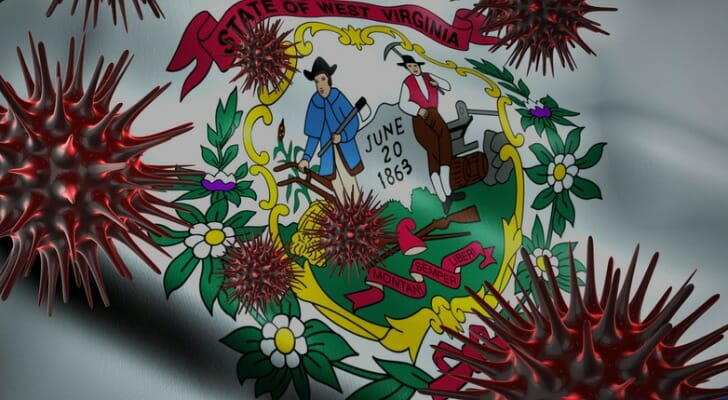West Virginia was the last state in the United States to report a coronavirus case, with its first confirmed case coming on March 17, 2020. Two months later the state had 1,427 cases and 60 fatalities. While that’s a relatively modest tally, businesses have been forced to close and residents have been ordered to stay at home since March 24. West Virginia doesn’t have any of its own relief provisions to help impacted businesses and families. However, the federal government is offering relief programs designed to help individuals, families and businesses get through the coronavirus crisis. If you’re looking for help with your finances during the pandemic, connect with a local financial advisor who can help.
West Virginia Coronavirus Relief for Individuals
West Virginia is one of a few states that hasn’t implemented relief programs for individuals and families directly. While you can go online and find resources for how to best protect yourself against COVID-19, you won’t find expanded unemployment benefits or additional stimulus programs at a state level. That being said, West Virginians still have access to a wide range of federal programs, such as stimulus checks, expanded unemployment benefits and more.
West Virginia Coronavirus Relief for Small Businesses
West Virginia is also one of only a few states who haven’t provided any state-specific coronavirus relief programs for small businesses. As the state government has for individuals, businesses can still go online and find resources on how to weather the economic storm caused by the pandemic. Businesses throughout the state will still be able to access the full suite of federal coronavirus relief programs, such as the Paycheck Protection Program (PPP) and Economic Injury Disaster Loans (EIDLs).
Federal Coronavirus Relief for Individuals

Through the Coronavirus Aid, Relief, Economic and Security (CARES) Act, the federal government has put together many coronavirus relief programs for families and individuals, the most notable of which are the one-time stimulus check payments. For these, any individual making less than $75,000 per year in adjusted gross income (AGI) is entitled to the full payment of $1,200. If you make more than $99,000 annually in AGI, you won’t be eligible to receive anything. Couples can receive up to $2,400, and families can claim $500 per child under the age of 17.
Individuals also have access to expanded unemployment benefits, rent and mortgage payment relief and paid sick and family leave as a result of coronavirus. The unemployment benefits expansion allows workers that have lost their jobs to claim an additional 13 weeks of unemployment benefits, as well as an extra $600 in weekly benefits until July 31, 2020.
Federal Coronavirus Relief for Small Businesses
The largest federal government relief program aimed at helping small businesses is the Paycheck Protection Program (PPP). Through the PPP, which has received two rounds of funding thus far, businesses can get loans of up to $10 million to cover 2.5 times their average monthly payroll, excluding salaries for employees above $100,000. These loans are designed to help companies avoid laying off their employees, they may be partially forgiven if used for eligible payroll expenses, among other qualifications.
The Economic Injury Disaster Loan (EIDL) Program is designed to help businesses cover general operating expenses. On a per business basis, EIDLs may range up to $2 million in size. Businesses will need to repay these loans, as the loan terms are for 30 years with a 3.75% interest rate for companies and 2.75% interest rate for nonprofits.Applicants will also receive forgivable advance grants of $10,000 to help cover immediate business expenses while their loan application is being vetted. As of this writing, the EIDL program is on hold due to a possible funding shortfall while the SBA works through the many applications it’s received.
Other small business programs include the SBA’s 7(a) loan program, the Express Loan Program, the Community Advantage Loan Program, the SBA Debt Relief Program, microloans and 504 loans.
Bottom Line

As West Virginia has not been hit particularly hard by the coronavirus pandemic, it does not have many state-level relief programs. In the coming months, if businesses and residents continue to struggle and the virus continues to spread within the state, it’s possible that West Virginia will implement such programs. Until then, there are plenty of federal coronavirus relief programs that businesses, individuals and families can take advantage of to make sure that they’re prepared to withstand the effects of COVID-19.
Tips for Managing Your Finances
- If you’re concerned about the impact on your financial plan, working with a financial advisor can help. Finding the right financial advisor that fits your needs doesn’t have to be hard. SmartAsset’s free tool matches you with financial advisors in your area in just five minutes. Get started now.
- Banks are stepping up to help customers that have been directly affected by the Coroanvirus pandemic. If you’re having trouble paying your mortgage or covering bank fees, find out what banks are offering relief in these tough times.
Photo credit: ©iStock.com/Ahmed Zaggoudi, ©iStock.com/tomwachs, ©iStock.com/JPecha
